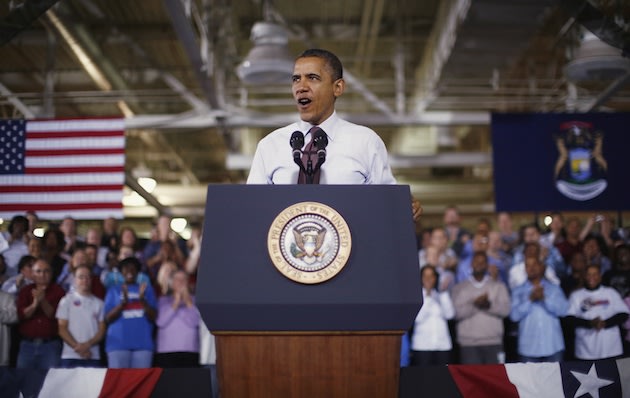 President Barack Obama at the Daimler Detroit Diesel plant in Redford, Mich., on Monday. (Jason Reed/Reuters)
President Barack Obama at the Daimler Detroit Diesel plant in Redford, Mich., on Monday. (Jason Reed/Reuters)
President Barack Obama traveled to the Daimler Detroit Diesel plant in Redford, Mich., Monday to issue a speech on the economy, pressure Republicans in Congress to raise taxes on the nation's top earners, and highlight Daimler's new $120 million investment in the plant.
But it was the president's criticism of Michigan's right-to work legislation that stole the show for the audience of Daimler union employees.
"What we shouldn't be doing is trying to take away your rights to bargain for better wages," the president told the audience, which immediately roared with cheers, applause and whistles. "These so-called right-to-work laws, they don't have to do with economics, they have everything to do with politics." They're about "giving you the right to work for less money," he added, noting that Michigan's history shows how unions have helped "build a better America."
New state right-to-work legislation, which forbids requiring all employees who benefit from a labor contract to pay union dues, is scheduled to move through the Michigan Legislature for final action this week. Republican Gov. Rick Snyder has pledged to sign the final version.
Activists have mobilized against the legislation, which they view to be an anti-union effort, resulting in a state Capitol lockdown last Thursday.
The president's comments Monday were his first public statements on the situation in Michigan.
His appearance was pegged to Daimler's announcement of its investment in the Detroit Diesel plant, which created 115 good, new "union" jobs, the president said. "That's great for this plant, good for this community, but it's also good for American manufacturing."
The president highlighted the plant as a symbol of how American manufacturing and auto industries are rebounding and growing in the new global economy.
"The competitive balance is tipping a little," the president said.
Obama appealed to the audience, which he characterized as middle-class, on the issue of the "fiscal cliff" by warning that the average middle-class family stands to pay $2,200 more in taxes next year if the automatic spending cuts and tax increases go into effect Jan. 1.
The president said America will head into a "downward spiral" if this happens, and placed the onus once again on Republicans to resolve the crisis by agreeing to raise taxes on households making more than $250,000.
"We've got to get past this whole situation where we've manufactured crises because of politics," Obama said.
Obama met Sunday with House Republican Speaker John Boehner, the GOP's lead voice on "fiscal cliff" negotiations, but no details of that conversation have been offered.
White House spokesman Jay Carney, during Monday's briefing on Air Force One en route to Michigan, also would not reveal any information. "I won't characterize yesterday's meeting or other conversations, but the president does believe we can reach an agreement," Carney said.











